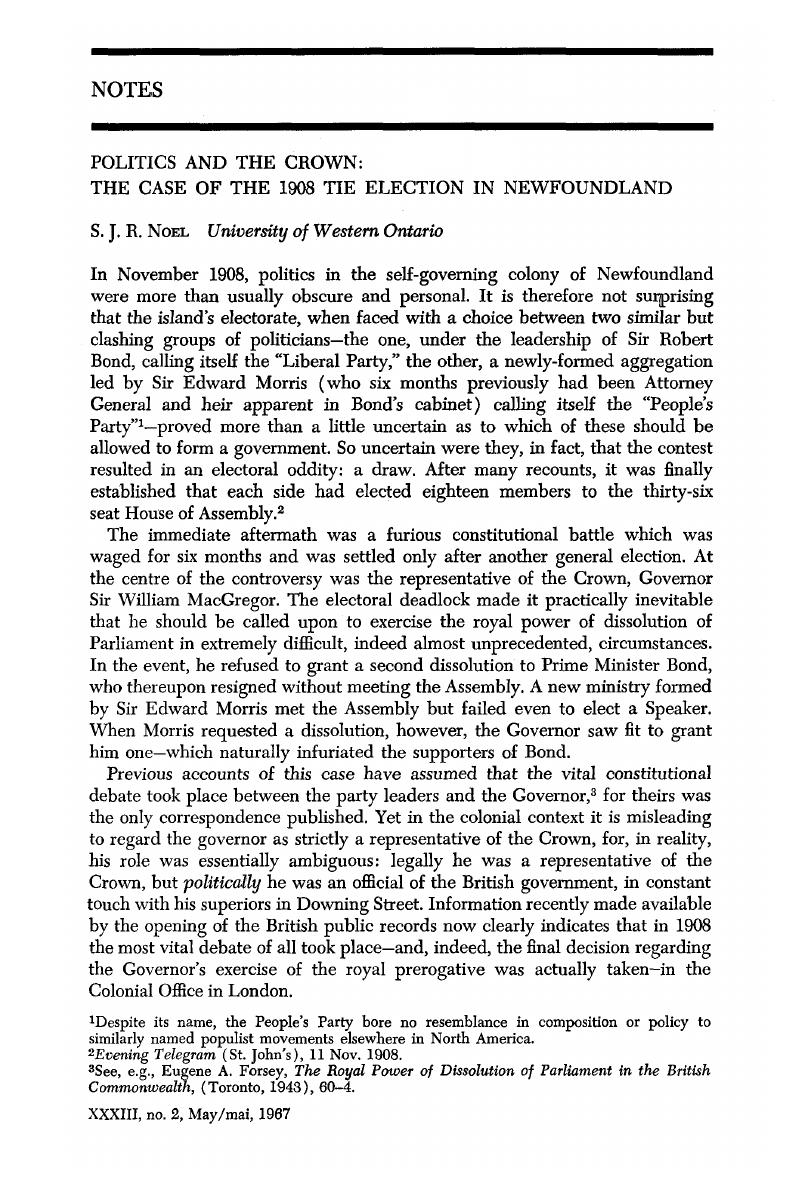No CrossRef data available.
Published online by Cambridge University Press: 07 November 2014

1 Despite its name, the People's Party bore no resemblance in composition or policy to similarly named populist movements elsewhere in North America.
2 Evening Telegram (St. John's), 11 11 1908.Google Scholar
3 See, e.g., Forsey, Eugene A., The Royal Power of Dissolution of Parliament in the British Commonwealth, (Toronto, 1943), 60–4.Google Scholar
4 Public Record Office, London, Colonial Office Records, Series 194, Vol. 273, Newfoundland Correspondence (hereafter cited as CO 194/273), Morris to MacGregor, 12 Nov. 1908.
5 This was not the view of the British Colonial Secretary, Lord Crewe, who was inclined to agree with Morris on this point: “under existing circumstances,” he wrote to the Governor, “you must exercise your personal discretion in making appointments or agreeing to contracts because your Ministers cannot claim your full support inasmuch as they have no Parliamentary Majority. Such contracts or appointments should therefore be confined to routine matters. …” (Ibid., Crewe to MacGregor, 16 Nov. 1908).
6 Ibid., Bond to MacGregor, 17 Nov. 1908.
7 Ibid., MacGregor to Bond, 24 Nov. 1908.
8 CO 194/275, MacGregor to Crewe, 7 Jan. 1909.
9 Ibid., Bond to MacGregor, 18 Feb. 1909.
10 Ibid., MacGregor to Crewe, 7 Jan. 1909.
11 Evening Telegram (St. John's), 18 02 1909.Google Scholar
12 Evening Chronicle (St. John's), 19 02 1909.Google Scholar (“Men as a rule do not make affadavit of their own integrity,” it declared).
13 CO 194/273, MacGregor to Bond, 20 Feb. 1909.
14 Ibid., Bond to MacGregor, 22 Feb. 1909.
15 Ibid., MacGregor to Bond, 24 Feb. 1909.
16 Ibid., MacGregor to Morris, 25 Feb. 1909.
17 Ibid., Morris to MacGregor, 25 Feb. 1909.
18 CO 194/275, MacGregor to Crewe, 26 Feb. 1909.
19 Shortly thereafter it was reported that “certain members of the Liberal Party” were offered “thousands of dollars” to alter their allegiance, and that “some of these offers have been increased since Sir Edward's advent to power two days ago.” ( Evening Telegram, St. John's, 5 03 1909).Google Scholar However, in the tense political atmosphere then prevailing it was improbable that any of the Liberal members could have been thus persuaded even to absent themselves from the Chamber while supply was being passed. Bribery remained a possibility, but without some positive indication that it would succeed it was hardly sufficient ground on which to base a firm assurance to the Governor.
20 Proceedings of the House of Assembly, Newfoundland (St. John's, 1909), 5.Google Scholar
21 CO 194/273, Morris to MacGregor, 31 March 1909.
22 Ibid.
23 Ibid., Bond to MacGregor, 6 April 1909.
24 CO 194/275, MacGregor to Crewe, 31 March 1909.
25 Mr. (later Sir) Arthur Berriedale Keith, at this time an official in the Dominions Division of the Colonial Office.
26 CO 194/275, Minute by A. B. K[eith], 1 April 1909.
27 Ibid., Minute by H. E. D[ale], 1 April 1909.
28 Ibid., Minute by H. W. J[ust], 1 April 1909.
29 Bond believed that reciprocal trade with the United States, rather than confederation with Canada, was Newfoundland's best hope of solving its economic difficulties. Accordingly, in 1902 he succeeded in negotiating a reciprocity agreement with the United States Secretary of State, John Hay; but, to Bond's chagrin, the United States Senate bowed to strong pressure from New England fishing interests and refused to ratify the agreement. In retaliation, Bond sought to obstruct the operation of the American fishing fleet in Newfoundland waters, where they enjoyed certain privileges under an Anglo-American treaty of 1818. However, the British government became alarmed by strong American diplomatic protests and withheld Imperial assent to the restrictive legislation passed by the Newfoundland legislature. See Fraser, A. M., “Fisheries Negotiations with the United States, 1783-1910,” in MacKay, R. A., ed., Newfoundland: Economic, Diplomatic, and Strategic Studies (Toronto, 1946), 333–410.Google Scholar
30 CO 194/275, Draft telegram, Crewe to MacGregor, 3 April 1909.
31 Ibid., Minute by A. B. K[eith], 5 April 1909.
32 Evening Telegram (St. John's), 26 04 1909.Google Scholar
33 Ibid. The Reid referred to was Mr. (later Sir) W. D. Reid, co-owner with his brother of the Newfoundland railway, a supporter and financial backer of Morris—and a frequent guest at Government House.